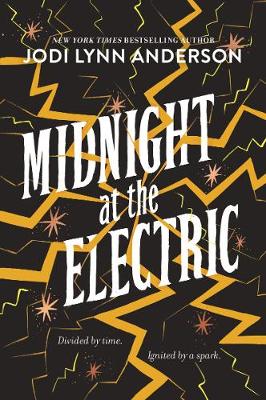Reviewed by jesstheaudiobookworm on
Each of the POVs was interesting in its own right and could have easily become a standalone installment, if Anderson had decided to make this into a series. I almost wish that she had, because each of these women’s stories was powerful enough to warrant closer inspection.
As it was, Jodi Lynn Anderson wove all three of the tales together in a subtly magnificent way. The common denominator between the three POV characters was a 150-year-old turtle named Galapagos. Using Galapagos to tie the three women together was an incredibly unique way to tell a cross-generational story.
I would be tempted to classify Midnight at the Electric as Historical Fiction, since two thirds of it take place in the 1920s and 30s. I was particularly intrigued by Catherine’s point-of-view, set in 1936 Kansas during the dust bowl. I wasn’t overly familiar with the setting, so Catherine’s story was surprisingly enlightening.
Midnight at the Electric was a contemplative listen. Anderson manages to insert minor themes of planet preservation (or lack thereof), leading to the somewhat underwhelming plot of leaving earth to live on Mars. I think Adri’s story, set in the year 2065, had the most potential, but I feel like there was a lot left on the table. Adri was the main protagonist. It was through her that we discover the stories of the other two women through lost letters. Adri is the main reason I feel this story could have been split into installments. She is preparing to go live on Mars (hence the science-fiction classification), but her story is overshadowed by the others.
Another seemingly important point that I think it was deserved more attention was The Electric, itself. If The Electric was important enough to spawn the name of the book, it should have been more essential to the plot. I was disappointed that did not hold more obvious prominence in the story.
However, I was not disappointed by Anderson’s priorities. The romance was minimal and appropriately understated. The prominent theme in Midnight at the Electric was friendship. More than that, Anderson emphasized that being family doesn’t have to mean sharing genetics. Anderson’s message was beautifully and eloquently conveyed.
Midnight at the Electric was a quick and easy listen, though I wouldn’t call it light. There were several times, especially toward the end, where my heartstrings were tugged. I was impressed enough with Jodi Lynn Anderson’s writing that I will be looking into more of her work soon.
Narration review: I chose to listen to Midnight at the Electric because of its narrators and in the end, I think I enjoyed it most because of them. I was already such fans of each of these three narrators individually, that hearing them all work together on a title was Christmas come early. Hiring a trio of narrators was the perfect call for Midnight at the Electric. This is the type of story that could easily have been bungled by too little distinction between POV characters. Marie, Carr, and Hardingham each held their own, remaining true to their respective characters. What’s more, they somehow managed to complement each other. Fantastic job, all around! ♣︎
Reading updates
- Started reading
- 24 June, 2017: Finished reading
- 24 June, 2017: Reviewed
